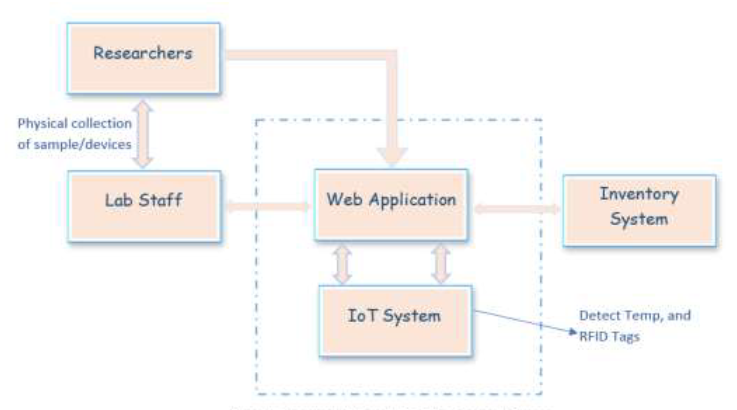Difference between revisions of "Template:Article of the week"
Shawndouglas (talk | contribs) (Updated article of the week text) |
Shawndouglas (talk | contribs) (Updated article of the week text) |
||
| Line 1: | Line 1: | ||
<div style="float: left; margin: 0.5em 0.9em 0.4em 0em;">[[File: | <div style="float: left; margin: 0.5em 0.9em 0.4em 0em;">[[File:Fig1 Mwambe IntJofAdvSciResEng22 8-4.png|240px]]</div> | ||
'''"[[Journal: | '''"[[Journal:Development of a smart laboratory information management system: A case study of NM-AIST Arusha of Tanzania|Development of a smart laboratory information management system: A case study of NM-AIST Arusha of Tanzania]]"''' | ||
Testing laboratories in higher learning institutions of science, technology, and engineering are used by institutional staff, researchers, and external stakeholders in conducting research experiments, [[Sample (material)|sample]] analysis, and result dissemination. However, there exists a challenge in the management of [[laboratory]] operations and processing of laboratory-based data. Operations carried out in the laboratory at Nelson Mandela African Institution of Science and Technology (NM-AIST), in Arusha, Tanzania—where this case study was carried out—are paper-based. There is no automated way of sample registration and identification, and researchers are prone to making errors when handling sensitive reagents. Users have to physically visit the laboratory to enquire about available equipment or reagents before borrowing or reserving those resources. Additionally, paper-based forms have to be filled out and handed to the laboratory manager for approval ... ('''[[Journal:Development of a smart laboratory information management system: A case study of NM-AIST Arusha of Tanzania|Full article...]]''')<br /> | |||
<br /> | <br /> | ||
''Recently featured'': | ''Recently featured'': | ||
{{flowlist | | {{flowlist | | ||
* [[Journal:Health informatics: Engaging modern healthcare units: A brief overview|Health informatics: Engaging modern healthcare units: A brief overview]] | |||
* [[Journal:A roadmap for LIMS at NIST Material Measurement Laboratory|A roadmap for LIMS at NIST Material Measurement Laboratory]] | * [[Journal:A roadmap for LIMS at NIST Material Measurement Laboratory|A roadmap for LIMS at NIST Material Measurement Laboratory]] | ||
* [[Journal:A model for design and implementation of a laboratory information management system specific to molecular pathology laboratory operations|A model for design and implementation of a laboratory information management system specific to molecular pathology laboratory operations]] | * [[Journal:A model for design and implementation of a laboratory information management system specific to molecular pathology laboratory operations|A model for design and implementation of a laboratory information management system specific to molecular pathology laboratory operations]] | ||
}} | }} | ||
Revision as of 16:50, 5 December 2022
Testing laboratories in higher learning institutions of science, technology, and engineering are used by institutional staff, researchers, and external stakeholders in conducting research experiments, sample analysis, and result dissemination. However, there exists a challenge in the management of laboratory operations and processing of laboratory-based data. Operations carried out in the laboratory at Nelson Mandela African Institution of Science and Technology (NM-AIST), in Arusha, Tanzania—where this case study was carried out—are paper-based. There is no automated way of sample registration and identification, and researchers are prone to making errors when handling sensitive reagents. Users have to physically visit the laboratory to enquire about available equipment or reagents before borrowing or reserving those resources. Additionally, paper-based forms have to be filled out and handed to the laboratory manager for approval ... (Full article...)
Recently featured:










